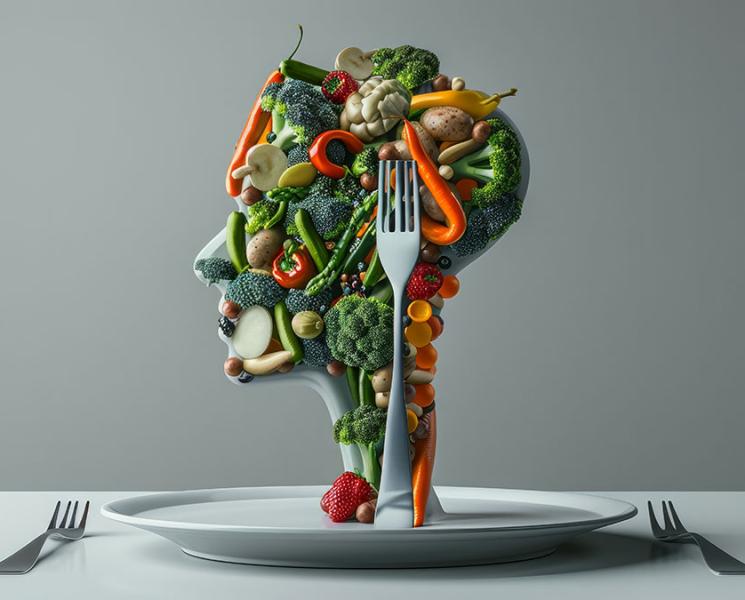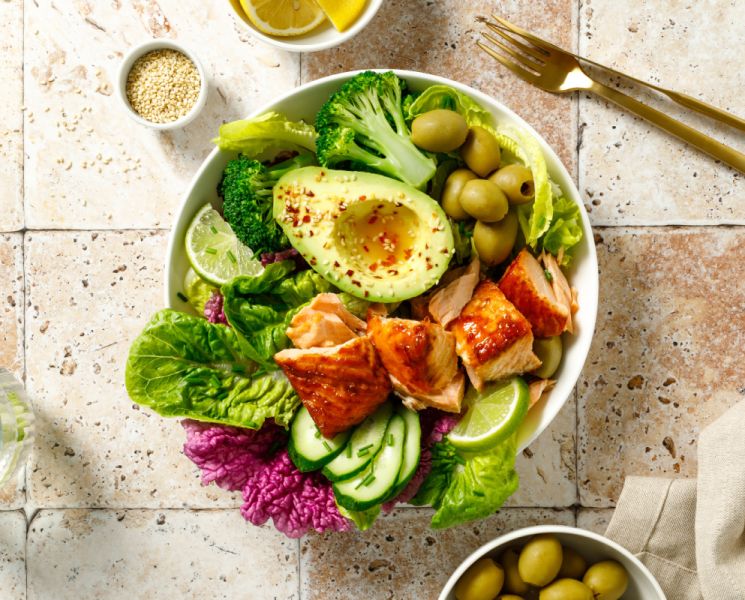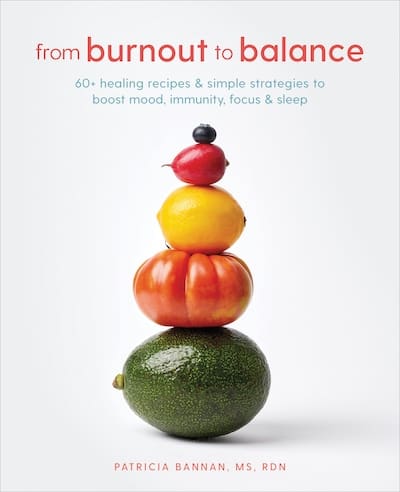Discover powerful nutrients and foods that can help lower cortisol naturally, providing a holistic approach to stress management and improved overall health.
In today’s fast-paced world, stress has become an unavoidable part of daily life for many. From demanding work schedules to personal responsibilities, stress can take a toll on our physical and mental well-being. One of the key hormones involved in the stress response is cortisol, often referred to as the “stress hormone.” Elevated cortisol levels over prolonged periods can lead to various health issues, including anxiety, depression, and impaired immune function.
However, there is hope. Research has shown that certain foods have the potential to naturally lower cortisol levels, offering a simple yet effective way to manage stress and promote overall health. In this article, we’ll explore foods that have been scientifically proven to help regulate cortisol levels.
What is Cortisol?
As mentioned above, cortisol is commonly known as the “stress hormone,” and is a hormone produced in response to bodily stress.
It also helps regulate certain body systems, such as blood glucose levels, metabolism, and the immune system. This is why it’s important to make sure that your levels aren’t abnormally high or low.
What Impacts Cortisol Levels?
Cortisol is typically measured through a blood test, though it can also be measured at home with a urine or saliva collection. Cortisol levels can be affected by many different factors, including:
- stress
- sleep (and lack of sleep)
- medication
- pregnancy
- time of day
It’s also worth noting that levels are often higher in the morning than in the afternoon.
How Does Cortisol Affect Your Health?
Chronic stress, which is often paired with higher levels of cortisol, can eventually turn into burnout. When burnout isn’t acknowledged, it contribute to type 2 diabetes, memory problems, and many other health problems.
Cortisol is also connected to the sleep cycle, so if your levels are too high, you might notice you’re not only getting less sleep, but poorer quality sleep as well. Being overtired contributes to higher cortisol levels—a vicious cycle of stress that’ll leave you burned out.
What Foods Reduce Cortisol Levels?
So, as you can imagine, the key is to keep cortisol levels in the normal range. The good news is that certain foods can play a role here.
Keep reading for some of the best foods to lower cortisol.
1. Vitamin C-Rich Fruits and Vegetables

While citrus fruits are renowned for their Vitamin C content, various other fruits and vegetables pack this essential nutrient. Berries, broccoli, potatoes, bell peppers, and Brussels sprouts are excellent sources of Vitamin C.
For a delicious dish rich in both Vitamin C and other vital nutrients, try my Pomegranate Glazed Brussels Sprouts.
2. Nuts and Seeds (Almonds, Walnuts, Chia Seeds)
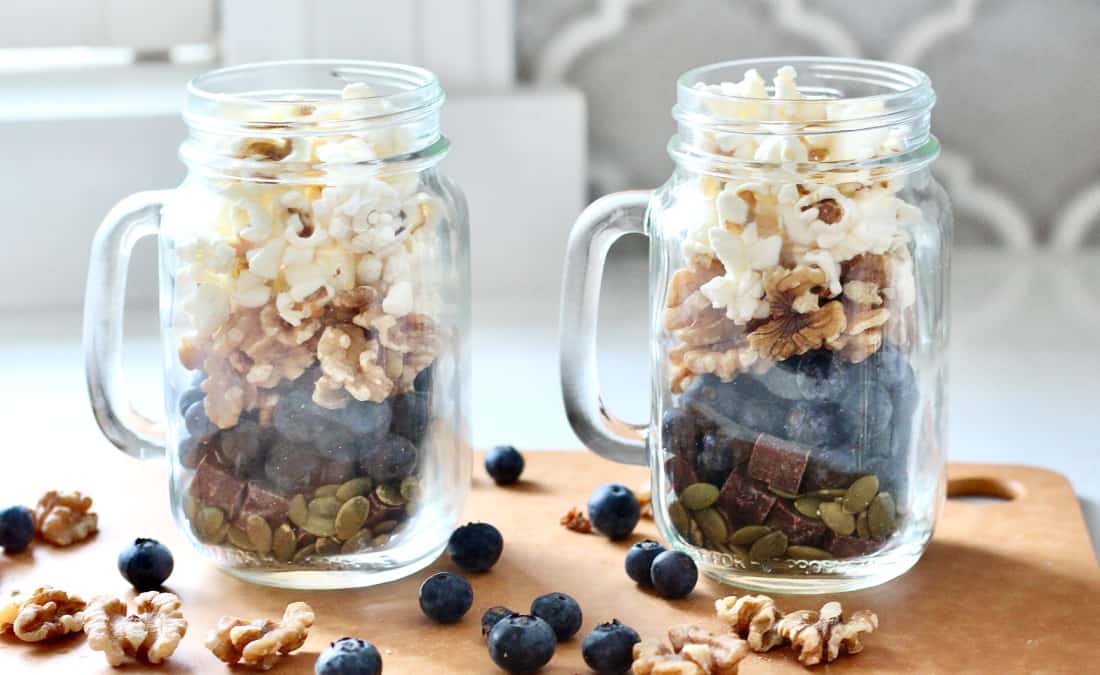
Consider sprinkling almonds or walnuts over salads, yogurt, or oatmeal for a satisfying crunch and dose of healthy fats. Chia seeds can be mixed into smoothies, yogurt, or used as a topping for fruit bowls or cereal.
When it comes to snacking, nuts and seeds are a healthier alternative to many processed snack foods that are high in refined sugars and unhealthy fats. Instead of reaching for chips or cookies, opt for a handful of nuts or seeds to satisfy cravings while providing your body with essential nutrients.
Try this Blueberry and Walnut Popcorn Trail Mix recipe to switch up your snack routine while keeping added sugar at bay. Packed with stress-reducing nutrients, it’s a delicious and wholesome option for any occasion.
3. Leafy Greens (Spinach, Kale, Swiss Chard)
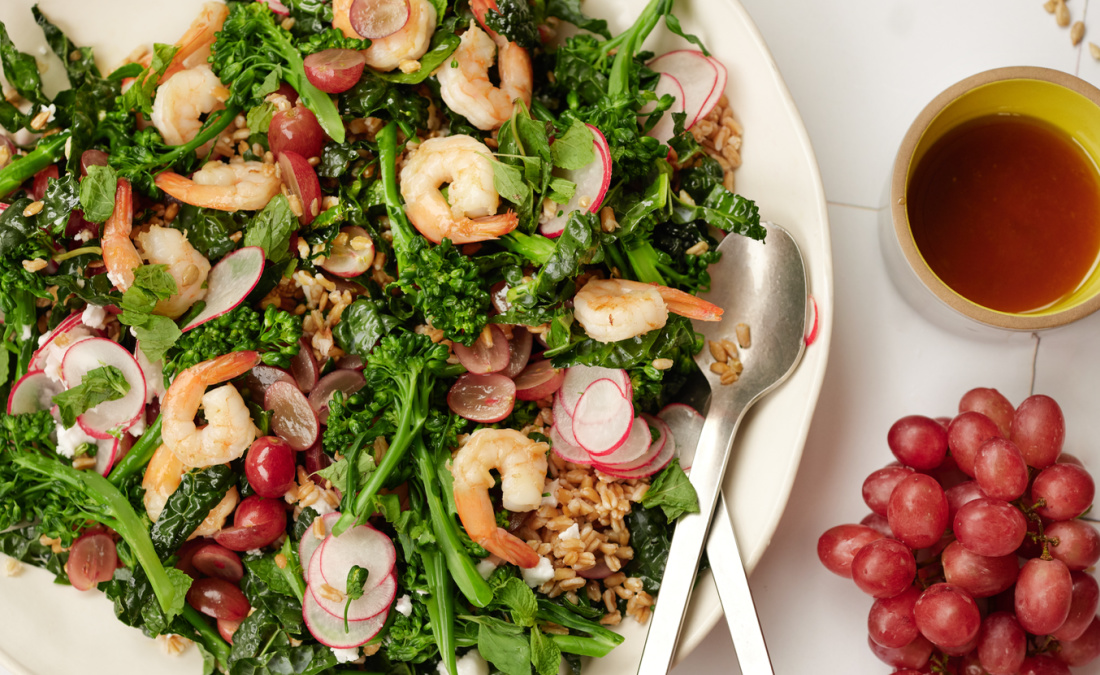
Spinach, kale, and Swiss chard are particularly rich sources of magnesium, making them excellent choices for stress reduction. Whether enjoyed raw in salads, blended into smoothies, or cooked in stir-fries and soups, leafy greens can be incorporated into a variety of dishes to support your overall well-being and help you better manage stress.
Try my Farro and Kale Salad with Shrimp for a beautiful pop of color with lots of flavor!
4. Fatty Fish (Salmon, Mackerel, Sardines)

Fish oil pills can also be used to supplement your diet. One study done on men found that after three weeks of fish oil supplementation, the body’s secretion of cortisol and epinephrine in response to mental stress was significantly lower than without the supplements.
If you’re seeking a simple yet delicious fish recipe, consider trying my Simple Skillet Salmon Burgers. These burgers are a hit with the whole family and can be easily prepared. Plus, you can make extra, freeze them, and enjoy them at your convenience in the months to come.
5. Polyphenol-Rich Dark Chocolate

One study found that participants who consumed 25 grams of polyphenol-rich dark chocolate per day (in comparison to regular dark chocolate) had reduced levels of total daily cortisol.
To ensure you’re getting polyphenol-rich dark chocolate:
- Choose dark chocolate with 70% or higher cocoa content
- Check the ingredient list for cocoa or cocoa solids
- Opt for reputable brands known for quality
- Look for labeling highlighting polyphenol content
Enjoy dark chocolate in moderation as part of a balanced diet for maximum benefits.
Next Steps to Take
Incorporating these nutrient-rich foods into your daily diet can provide not only delicious meals but also natural support for managing cortisol levels and promoting overall well-being. For more delicious recipes (and top tips) to free you from burnout, check out my book From Burnout to Balance.
Now that you’ve read about the best foods for reducing cortisol levels, continuing reading and learn about 10 other proven ways to help with stress.
References
- Kamba A, Daimon M, Murakami H, et al. Association between Higher Serum Cortisol Levels and Decreased Insulin Secretion in a General Population. PLoS One. 2016;11(11):e0166077. Published 2016 Nov 18. doi:10.1371/journal.pone.0166077
- Morey JN, Boggero IA, Scott AB, Segerstrom SC. Current Directions in Stress and Human Immune Function. Curr Opin Psychol. 2015;5:13-17. doi:10.1016/j.copsyc.2015.03.0071.
- Cortisol Test: MedlinePlus Medical Test. Accessed April 2, 2024. https://medlineplus.gov/lab-tests/cortisol-test/
- Thau L, Gandhi J, Sharma S. Physiology, Cortisol. [Updated 2023 Aug 28]. In: StatPearls [Internet]. Treasure Island (FL): StatPearls Publishing; 2024 Jan-. Available from: https://www.ncbi.nlm.nih.gov/books/NBK538239/
- de Oliveira IJ, de Souza VV, Motta V, Da-Silva SL. Effects of Oral Vitamin C Supplementation on Anxiety in Students: A Double-Blind, Randomized, Placebo-Controlled Trial. Pak J Biol Sci. 2015;18(1):11-18. doi:10.3923/pjbs.2015.11.18
- Otocka-Kmiecik A, Król A. The Role of Vitamin C in Two Distinct Physiological States: Physical Activity and Sleep. Nutrients. 2020;12(12):3908. Published 2020 Dec 21. doi:10.3390/nu12123908
- Beglaryan N, Hakobyan G, Nazaretyan E. Vitamin C supplementation alleviates hypercortisolemia caused by chronic stress. Stress Health. Published online November 27, 2023. doi:10.1002/smi.3347
- Pickering G, Mazur A, Trousselard M, et al. Magnesium Status and Stress: The Vicious Circle Concept Revisited. Nutrients. 2020;12(12):3672. Published 2020 Nov 28. doi:10.3390/nu12123672
- Delarue J, Matzinger O, Binnert C, Schneiter P, Chioléro R, Tappy L. Fish oil prevents the adrenal activation elicited by mental stress in healthy men. Diabetes Metab. 2003;29(3):289-295. doi:10.1016/s1262-3636(07)70039-3
- Tsang C, Hodgson L, Bussu A, Farhat G, Al-Dujaili E. Effect of Polyphenol-Rich Dark Chocolate on Salivary Cortisol and Mood in Adults. Antioxidants (Basel). 2019;8(6):149. Published 2019 May 29. doi:10.3390/antiox8060149


